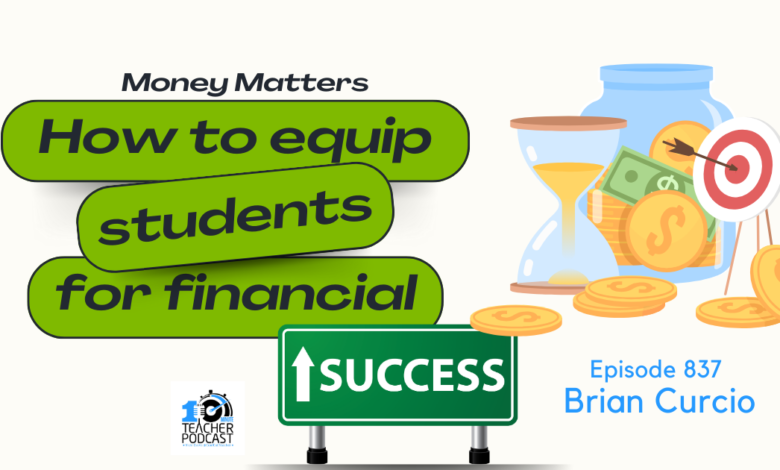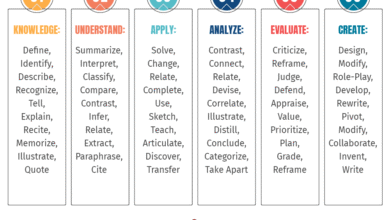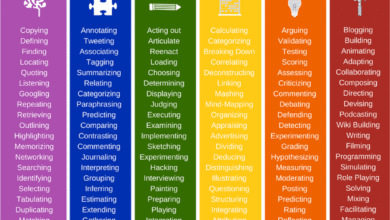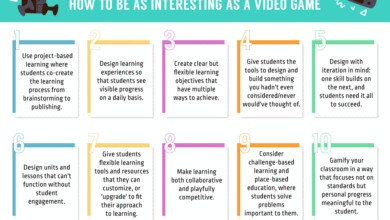How to Equip Students for Financial Success

AI-generated, checked by me. Email me about any mistakes.
Transcript
Transcript
Vicki Davis (00:00)
Hello, Remarkable Educators. Today we’re talking about something I’m absolutely passionate about, financial literacy. And we have Brian Curcio with us today. He has an organization called Rapunzel. It has a lot of resources for kids and also financial literacy resources for educators. And Brian, thanks for coming on the show.
Brian Curcio (00:22)
Oh absolutely, thanks for having me.
Vicki Davis (00:24)
Yeah, so today we’re talking about why do we need to teach financial literacy in schools? And I’ve actually seen research that I’ll include the show notes that most parents actually think we should be. So that’s one good reason, but what are the practical reasons?
Brian Curcio (00:42)
Yeah, I mean, there’s so many practical I mean, one of the things I like saying a lot is we tell our kids that money makes the world go round, but for some reason we don’t really teach it to them. So I think when you’re looking at issues around credit card debt or first home ownership or even just trying to be more informed citizens and understanding kind of that wages haven’t kept up with inflation and things like that, I mean.
Financial literacy is really important because the people in charge of all these organizations are making decisions based around the financial implications. So you have to understand that in order to understand the motivations of these I think.
Vicki Davis (01:25)
And there’s a lot of I mean, that goes on you know, there’s a big difference between your money working for you and you working for your And when you have debt, you know, those of us who have debt, times of debt and paid our way out and see the other it’s all the difference in the world, isn’t it?
Brian Curcio (01:46)
Right. And it’s having responsible debt. And I mean, I think you hear a lot of stories of people that do everything right. And if you do everything right, you’re taking out a loan for college, you’re paying off those student loans. And by that just around the time you’re paying those off, now you’re taking on debt for a home. And so it’s like, they get you on a little hamster wheel. And so understanding how debt works and kind of your credit impacts how much you’re paying overall and interest. I mean, it’s really important. I think there was
A stat that came out last year that the average American wastes about $1,800 on financial illiteracy each year. And when you look at how many families there are so close to that poverty line, it’s like the lack of financial education is placing millions of Americans into poverty just by not having the understanding of these skills.
Vicki Davis (02:25)
Wow.
Well, and kids can put parents in debt too. I mean, they can go in these video games and rack up all kinds of debt if parents aren’t careful to monitor that. So let’s talk about some practical ways to bring financial literacy education into the classroom. What are some of the things that teachers need to be teaching, let’s say, in middle school?
Brian Curcio (03:02)
Yeah, so I mean, I think middle schools are great. The earlier, the better with financial literacy. So I think in middle school, you’re starting to develop the math skills around percentages. So you can kind of start looking at budgeting, saving, and then even some basic interest rates. And that typically helps build a stronger foundation so that then you can start talking about like compound growth and looking at credit card debt later by like eighth grade, high school.
Um, but you really want to have a basic understanding of a lot of these things because by the time you get to high school is when it’s like the marketing begins um, and they’re pushing everything, everything back earlier. So I think trying to get those foundational skills and then looking at. By freshmen, sophomore year, trying to focus a little bit on the investing side and understanding and.
Because the investing is really cool that you can have a lens to view all these different companies and it’s actually a great way for career exploration for So we’ve had, when we talk in the classroom, it’s like, and kids want to add Snapchat to their simulated portfolios. It’s like, now you have to understand how Snapchat makes money before you can invest in them. And so it’s really helping kids kind of like a different relationship with some of these companies.
Vicki Davis (04:22)
I know for my children, we started them, there’s an app called Acorns really early on of, okay, let’s start saving and let’s start seeing it grow. Because you know, when the kids get those credit card offers in the mail, which happened in high school, they look at that and it says, you know, $800 of credit. The kids think they have $800 to spend, then they don’t understand.
Brian Curcio (04:25)
Mm-hmm.
I was just as bad in college. I called my parents, I was like, these credit cards, this is a great deal. Like, no wonder you guys buy such nice things. I was like, I owe $30. That’s the minimum payment. And my mom had to call my dad, dad calls, he’s like, Are you an idiot? It’s like, I thought we taught you these things. And I’m like, but that’s the thing is that I think people over time, they start feeling like, Oh, I am an idiot, because I don’t understand this. And it’s like, we were never taught it in And now we’re in a challenging situation that a lot of teachers are.
teaching it for the first time in that they weren’t taught it in school either. And so it’s trying to figure out ways that got to get kids engaged. But like you said, I mean, kids love money. It’s really just like, once you have them recognize like, no, that we’re talking about money today. It’s like, I’ve yet to find a classroom where the kids aren’t interested in hearing about it.
Vicki Davis (05:35)
Yeah, they are interested. And you know, there may be some teachers who say, well, you know, first of all, teachers aren’t paid what teachers should be paid. And so many teachers struggle financially and they feel like, well, Hey, one requirement of teaching something is that I understand it first. And I’m not sure I understand it. what, what can, I mean, anything can be learned, right?
Brian Curcio (05:58)
Right. And so what we’ve done, we have the simulator, we always thought about the idea of how can you have teachers engaged with it? And so what we’ve done in all of these little investment competitions that we host is that the teachers can actually join in and the teachers can compete against the students or compete against each Um, and so that’s kind of what we’ve just tried to bring like authenticity into the classroom where it’s like, look, I also don’t understand this great kids, but.
over the next few months, we’re going to learn about it together. We found that that’s really beneficial. And I think there’s this issue where we tell people that you’re not supposed to talk about money. And it’s rude when you talk about money, you don’t talk about how it’s challenging to save or whatnot. And it’s like the richest people in the world talk about money all the time. They’re talking about their investments at dinner, they’re talking about it. So I think what we’re trying to do is just make those conversations in the classroom more natural.
Let the teacher admit here, I don’t know this piece, but the kids can go research it. I mean, we’d be hard pressed to find a 65 year old investor that understands Roblox better than Um, so the kids do have expertise in some of these fastest growing And so it’s kind of, it’s interesting to learn from them a lot of the times too.
Vicki Davis (07:12)
Mm-hmm.
Well, here’s the thing. If we refuse to talk about financial literacy in our classrooms, the number one indicator of success of our students will be the financial level of their parents. And because parents who are successful financially will teach their kids to be successful financially, but as educators, we want that to be accessible and available to all of our students.
We want to break the cycle of poverty and we want to help kids have a healthy relationship with the money, not lay awake at night worrying about how they’re going to pay, you know, six credit cards in their rotate pay and, you know, putting one on one to pay another, which is no way to Um, and you know, so many of those decisions, like you said, are made in high school and in college that they give a kid debt. Yeah, they want to pay off their student loan, but they got to pay the credit card off first, right?
So it’s just such an important topic.
Brian Curcio (08:22)
Yeah, and there’s just it’s there’s so much knowledge that’s been kept from people. We tell the kids a lot is the reason that bankers have such nice suits, and they’re in the best real estate downtown is because they never taught you about this in school. And so I think yeah, it’s trying to understand how you pay off debt in the right way, how not to accumulate too much debt. But it’s also I think, one of the challenges I will say there’s been great movement in about
27, 28 states require financial literacy to graduate high school. The one piece that I personally would like to see is that we spend a lot of time on budgeting and saving, and we do a lot of discussions around how low middle income communities aren’t very good at budgeting and saving. And I just wish more people would appreciate the research that’s come out that it’s not that people are better or worse savers.
Vicki Davis (08:54)
Mm-hmm.
Brian Curcio (09:20)
is that there’s not enough money coming in to begin with. And I think once you develop like that financial vocabulary and you’re able to express that, I think that’s when it’s kind of like, okay, it’s not about budgeting if you’re making $10 an hour and have three, it’s like, there’s kind of, so I think it’s being able to appreciate where you sit within this broader economy and the role you play in it, I think that’s also powerful.
Vicki Davis (09:24)
Yeah.
Yeah.
Yeah, you know,
even in choosing majors and looking at the college you want to go And, you know, sometimes all it takes is a tool or a conversation about price. Not that we don’t want kids to live their dreams, but you do have to have a reality of, okay, if I’m going to this college out of state, but I’m going to go into a job that pays 30 something thousand a year. Is that really the wisest thing to do? Because as you’ve said, it’s that the math.
doesn’t work when you do that. It’s not that you’re not budgeting, you can’t count what you don’t have.
Brian Curcio (10:26)
Right. And I don’t think that even, I don’t necessarily think that it is killing kids’ dreams. It’s kind of like, look, it’s giving them the full picture of like, you have this dream, but you will be on a weekly basis if this is your path. Money’s going to be your primary concern for your entire life. So it’s kind of, I think, letting students have that. And I do think the colleges should be doing more in terms of kind of outlining and providing that.
Vicki Davis (10:45)
Yeah.
Brian Curcio (10:55)
career advice. I went to a liberal arts college and I wasn’t really allowed to take professional classes. So that was where I was a little disconnected, but I think, and I had a lot of friends who struggled from that, that chose majors and career paths without really thinking of the implications of paying back their student loans. So I think kind of having the colleges talk about this is going to be one of your, this is a great major if you want to pay it off as soon as possible. This is a major if you’re more passionate about it.
Um, but the challenge is doing that in a way that doesn’t kind of undervalue people’s passions, be like, you’re not so passionate about painting. You should be a math Um, so that piece of it I could see as being kind of letting kids learn about what they want to learn is also powerful.
Vicki Davis (11:38)
Uhhh…
Well, money is important. We all need to know that we need to be teaching it. I know you have a lot of resources that folks will check out in the show notes. Brian Curcio from Rapunzel and educators. I talk a lot about financial literacy because this is something that we need to bring to all of our classrooms so that we can help all of our children have a healthy relationship with money. Thanks, Brian.
Brian Curcio (12:12)
Absolutely. Thanks for having me.



